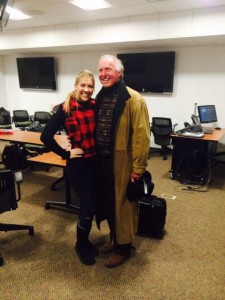
Hal Milton, right. Trying our best at a glamour shot on a cold, snowy November day at the University of Notre Dame.
A post by our student blogger Megan
We often encounter a teacher at least once in our lives that challenges our way of thinking and pushes us past our comfort zone that ultimately helps us transform into better people. Often times, we recall these educators years down the road when our minds drift to a defining moment or a distinct phrase of encouragement that this professor once provided us. The MSPL is fortunate to have a group of inspiring and incredibly intelligent professors teaching patent law curriculum. Harold W. Milton, Jr., is one of these select few. Mr. Milton, or “Hal,” as the students call him, has had a long, storied career in the patent world. Hal began his journey at Purdue University, where he received his undergraduate degree in aeronautical engineering. He then worked in the private sector testing rocket engines. Hal was later an Air Force pilot, missile instructor and soon after attended law school at Georgetown University. He has practiced patent law since 1964 and continues to work at a Michigan law firm, as well as teach patent drafting at the University of Notre Dame, where he has continued authoring the book for his class which is currently on sale at Amazon.com.
Hal’s weekly classes are packed with two hours of lively discussion that dares his students to think without limits. He encourages them to speak their minds, argue effectively, and, most importantly, find a new result that can be patented. Hal has supplied his class with a wealth of knowledge and pushed them to be their best. The following is a brief interview with Hal Milton, an attorney with a legendary patent career who has a mission to properly build the patent system from its roots starting with each and every one of his students.
Why did you decide to become an engineer and then ultimately become a patent attorney?
“Life is a series of choices. However, the first hurdle is to recognize that a choice exists. Once you recognize a choice, you must go with your gut. At the age of thirteen, I wanted to be an Air Force fighter pilot. A high school counselor made me aware of aeronautical engineering at Purdue, coupled with Air Force ROTC. My roommate in pilot training made me aware of the possibility of law school. A second fellow Air Force officer made me aware of the possibility of working for the government in Washington D.C. to support my family of three daughters while attending law classes in the evening. When I asked him where in the government, he replied with the USPTO. That was the first time I had ever heard of U.S. Patents. After law school in 1964, we moved back to our home in metro-Detroit and I entered private practice.”
Why did you come to Notre Dame to teach in the MSPL program?
“I began training interns who had science degrees and were attending evening law school classes while they worked during the day in our law firm. This led to teaching in law schools in the late 1990’s. One of those interns, now an associate at my present law firm, told the Director of this program, Karen Deak, about my course. Karen invited me to teach the course at Notre Dame. It was an offer that I could not refuse.”
What surprises you about your students?
“How intelligent they all are and how they use it to understand—they stay engaged in class.”
You often times tell your students that they are ahead of other new patent agents and attorneys; explain what you mean by this.
“My book is full of litigated patents which failed because of claim structure and intrinsic content. Each student, by performing the exercises for this course, prepares a higher quality patent application than these failed litigated patents—even though most of the litigated patents were prepared by persons with years of experience.”
What is the most important piece of advice you could give a brand new patent agent or attorney?
“Draft six to ten patent applications under a good mentor as soon as possible!”
What is the greatest highlight of your career so far?
“Writing the course book; I could not have done it without the long career and the feedback from my students and interns.”
If you weren’t a patent attorney, what would you be?
“An Air Force pilot or a mediocre engineer.”
What’s next for you—will you continue to teach, as well as practice at Dickinson Wright?
“I plan on training patent agents and attorneys and perfecting my training tools until I die. In the remaining time, I plan to finish writing a book focusing on the human interest side of patent stories entitled ‘Patent Paradise Found by Milton’.”